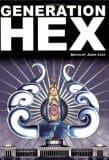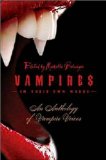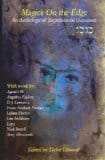Anthologies provide themed essays from a variety of writers, allowing the reader to sample an assortment of styles and opinions. Finding new writers can be difficult for the average person, there’s so much out there that’s useless, or worse. Anthology pieces always vary in quality, and are frequently contradictory when taken as a whole, but that can be part of their charm.
 Generation Hex was released last year, edited by Jason Louv and published by the folks at Disinformation.com.
Generation Hex was released last year, edited by Jason Louv and published by the folks at Disinformation.com.
It’s a collection of essays written by magickians under thirty, several of whom I’m familiar with online, and some I’ve not spoken to for years. I found it a great nostalgic piece, despite the fact it was supposed to be cutting edge; it more reminded me where I’ve been, and where I’ve found others. It’s the kind of book you can read to know you’re not alone.
 Michelle Belanger edited Vampires in Their Own Words: An Anthology of Vampire Voices, published by Llewellyn in October, an anthology of vampires writing about themselves.A lot of it is self indulgent, and many of their stories sound the same, but for another vampire picking this up and reading this material for the first time it will seem a comfort: that sense of familiarity, though the variety of opinions on what the correct conduct “should” be may appear confusing. Even so, this anthology does provide a broader view of vampirism as a condition, lifestyle and general subculture for those merely seeking to better understand it, and for that it should be commended. (Full review here.)
Michelle Belanger edited Vampires in Their Own Words: An Anthology of Vampire Voices, published by Llewellyn in October, an anthology of vampires writing about themselves.A lot of it is self indulgent, and many of their stories sound the same, but for another vampire picking this up and reading this material for the first time it will seem a comfort: that sense of familiarity, though the variety of opinions on what the correct conduct “should” be may appear confusing. Even so, this anthology does provide a broader view of vampirism as a condition, lifestyle and general subculture for those merely seeking to better understand it, and for that it should be commended. (Full review here.)
 I just finished reading Magick on the Edge: Adventures in Experimental Magick, edited by Taylor Ellwood and published by Immanion Press. Again, I know many of the occultists who wrote for the anthology, talented people, though it’s another mixed bag.1 Its theme is “experimental occultism” and while I understand that they’re likely trying to set themselves apart from chaos magick – surely all magick should be experimental? Without experimenting (“doing the work”), how can one expect to achieve any measure of success? There are some great pieces in here, particularly in the last section on “Inner Alchemy.”
I just finished reading Magick on the Edge: Adventures in Experimental Magick, edited by Taylor Ellwood and published by Immanion Press. Again, I know many of the occultists who wrote for the anthology, talented people, though it’s another mixed bag.1 Its theme is “experimental occultism” and while I understand that they’re likely trying to set themselves apart from chaos magick – surely all magick should be experimental? Without experimenting (“doing the work”), how can one expect to achieve any measure of success? There are some great pieces in here, particularly in the last section on “Inner Alchemy.”
First published on Plutonica.net 18 November 2007.
- Of course, everyone I know who wrote for it was brilliant. *cough* [↩]







